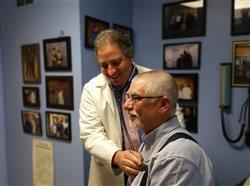
Feel rushed at the doctor’s office? How to get more 1-1 time
(BPT) – For patients and physicians alike, the current health care environment has never been more promising, but it’s also frustrating. While there are more medical advancements and treatment options than ever before, the importance of the doctor-patient relationship has taken a backseat in the health care continuum.
For most people, this means scheduling a visit with a primary care provider can take weeks, and diagnostic testing and specialist appointments can take even longer. Office wait times are on the rise while individuals increasingly receive limited access to their doctor – often 10 minutes or less per visit.
This impacts not just the patient experience, but outcomes as well. Many physicians feel that in order to ensure optimal care, creating a stronger doctor-patient relationship is essential. More and more of them are turning to concierge medicine as an alternative.
Concierge medicine is a membership-based personalized care program where patients have direct access to their physician, spend a great deal more time with their physician than the health care system traditionally allows for and focuses on prevention and wellness in addition to acute care and disease management. This type of program is a growing phenomenon which has been embraced by thousands of physicians and patients who recognize time is the essence of quality with regard to patient care.
Gregg Marella, M.D., of Medham, New Jersey, is one such example. Dr. Marella states, ‘With concierge medicine, patients get more of my time. I can set aside space specifically for any problems or issues that arise. Health care is more immediate and responsive.’
Choosing the concierge model allows Dr. Marella to offer true continuity of care, which has already made a big difference. For instance, a patient came to him reporting symptoms that Dr. Marella thought sounded like a possible brain tumor. When tests confirmed Dr. Marella’s suspicions, he recommended a neurosurgeon. Unlike the typical health care model in which a primary care physician has very limited time to devote to a patient’s direct care, let alone a referral visit, the concierge approach gave Dr. Marella the freedom to attend the neurosurgeon appointment with the patient, which turned out to be quite helpful.
‘Visiting a specialist doctor like a neurosurgeon can be very challenging and stressful,’ he admits. ‘My presence allowed my patient to listen emotionally to what the neurosurgeon was communicating while I could listen clinically, which in this case allowed me to optimize time frames and provide more streamlined care for my patient.’
But this is hardly the only instance where the concierge model has improved care levels.
Another one of Dr. Marella’s patients suffers from severe anxiety and fears to leave his family’s home, or even his bedroom. Because Dr. Marella sees fewer patients in the concierge model of care, he’s been able to make house calls to perform bloodwork and other tests his patient requires. The patient’s mother has been very impressed. ‘I can’t tell you how important Dr. Marella’s home visits are. In that regard it’s been a miracle. I’ve had nothing but great experiences with Dr. Marella and the concierge medicine model of care.’
In an age when medical discovery holds more promise than at any time before, too many physicians and patients are missing out on one of the most powerful tools of treatment – a stronger doctor-patient relationship. For that, physicians need time with their patients and patients need access and time with their physicians. Concierge medicine is helping to make both possible.
To learn more about how concierge medicine is changing the health care landscape, and how physicians like Dr. Marella are successfully implementing a hybrid or full concierge medicine program into their medical practice, visit www.paragonprivatehealth.com.


